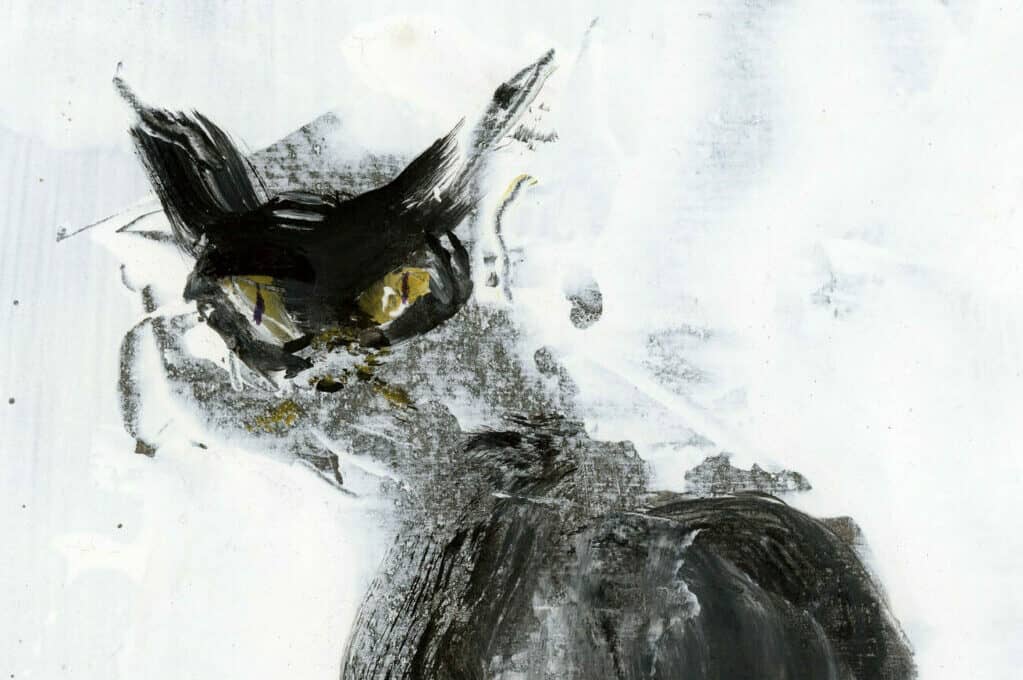“He has no right brain.”
“Of course he does. It’s right there.”
“That’s where it should be. Nothing is there.”
“I see.”
“What do we tell Doctor Wills?”
“We need to run a P.E.T. scan.”
“And Mr. Loomis?”
“Tammy will schedule the appointment.”
While the senior and junior radiologists discussed the unusual black shape obscuring the right hemisphere of Ian Loomis’s brain, the patient under speculation sat in the Nuclear Medicine waiting room, waiting for his daughter to return from the hospital cafeteria. He sat with the toes of his running shoes in perfect alignment, tips of his knees parallel, hands palm-down, precisely mid-thigh. He wore pressed jeans and a t-shirt reminiscent of a 1970’s psychedelic tablecloth. The crown of his faintly grey hair shone with grease, but Ian was not an unclean man; he would bathe every day if it were up to him, if the cats didn’t consume all the hot water.
“The cats drink cold water,” Stella reminded him daily. It was the only way she could convince her father to shower. (Doctor Wills once chastised her for indulging his delusions. “Miss Loomis, you have to engage him differently to find an effective solution.”)
The senior radiologist called the next patient into the prep room and the junior radiologist spoke to Ian. “We need to do more tests, Mr. Loomis.”
Ian smiled. “My daughter will be here soon. She’s gone to get some coffee and kibbles.”
“Kibbles, Sir?”
“They don’t eat tuna like Finnegan used to.”
The radiologist nodded as he jotted ‘glaucoma?’ in the Observations section of Ian’s file. He presented the file to Tammy and said, “Schedule a P.E.T. and write a referral to neuro-op, please.”
“Doctor Wills writes the referrals,” Tammy said, after a yawn.
Ian rose and traveled the perimeter of the waiting room. The soles of his running shoes produced a squishing sound as they peeled away from the PVC flooring. He gazed at his feet as they carried him from corner to corner of the small area, and giggled each time his running shoes squished.
“Dad?” Stella arrived with two cups of coffee and a brown paper bag. Ian continued to pace.
“Dad, here. Coffee and a bran muffin.”
The junior radiologist spoke to Stella. “Excuse me, Miss Loomis, does your father have a family history of glaucoma?”
Stella held out a coffee cup as her father paced by. He ignored it but nimbly seized the brown paper bag tucked between her bicep and ribcage. “Kibbles!”
“No, dad, bran muffin.”
Ian frowned and dropped the bag into the wastebasket. “I have to go to the bathroom,” he said, and wandered off.
“You should probably go with him,” the radiologist advised.
“What’s the worst that could happen? We’re already at the hospital. I’d just like a day off, you know? No, no history of glaucoma. And yes, I should make sure he finds his way.” She smiled stiffly and retrieved the brown paper bag from the wastebasket.
“Does your father like cats?”
“Pardon me?”
“He’s rather taken with them.”
“He had a cat once. It liked tuna.”
“I don’t mean to pry.”
“Please, pry away. In fact, maybe you can tell me if it’s hereditary. Maybe I’ll see horses. Mine likes molasses.” Stella proceeded to joke about other things she might see or think if she had dementia, but there was no true humor in her ideas about death and the ugliness leading up to it. She had not slept efficiently or consumed a nutritious meal in months, and suddenly everything was comedy.
“Maybe that nothingness where his right hemisphere’s supposed to be is a big black cat!” she said, stumbling backward onto a waiting room chair, legs jutting out in front of her like a child’s.
The radiologist rocked back and forth in his white loafers. He was rarely privy to intimate moments in the Nuclear Medicine unit; he wanted to draw this one out. He retrieved Ian’s file from Tammy’s desk. “Let’s see if it isn’t a big black cat on his right hemisphere after all!”
Stella rose and leaned over his shoulder, and the two pored over the scan images. Indeed, there was a big black something where Ian’s right hemisphere was supposed to be, but it did not resemble a cat or anything like one.
“My father has no right brain,” Stella whispered.
“There, there. We’re going to do more tests.”
“See, I thought if maybe the image looked just a little like a cat, you know, like a Rorschach, we could conclude he’s seeing things inside out. That would make sense, right?” Tammy cleared her throat. Stella and the radiologist looked up.
“There is a man in the cafeteria demanding kibbles,” she said, hanging the telephone receiver in the air like a dirty cloth. “Miss Loomis, please fetch your father before they have to call a code.”
Please fetch your burdensome father because we can’t be bothered. Stella wanted to throw something at Tammy, but she had nothing to throw except a scowl.
The radiologist clapped Ian’s file shut and then looked as though he had been caught looking at porn.
He coughed dryly. “You will need to accompany your father to his next appointment.”
“I have to go to the bathroom,” Stella said, and wandered off.
–
April L. Ford is the Managing Editor of Digital Americana magazine. She teaches Creative Writing at SUNY Oneonta. She likes short sentences. In February 2013, her first short story collection, The Poor Children, was shortlisted for Salt Publishing’s international Scott Prize (UK). The adrenaline from this has since worn off, and April fears she has become one of the “Where are they now?”
Lead image: “Indie” (via Flickr user Frédéric Glorieux)

